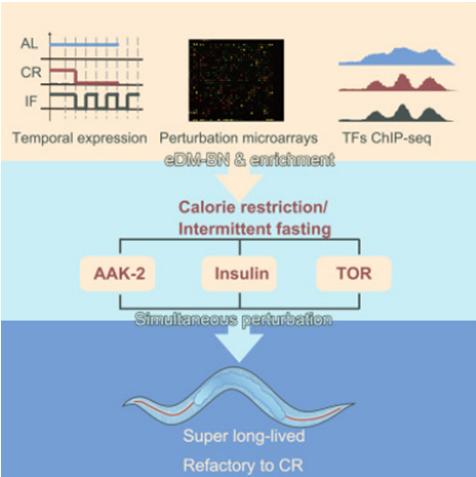
Aging, intimately related to human health and complex diseases, has been under extensive study. Dietary Restriction (DR), as a powerful natural means to extend lifespan across multiple organisms, is a classical paradigm for aging study. Although several genes and pathways related to nutrition sensing and stress response can mediate responses to DR regimens, no single genetic intervention has recapitulated the full effects of DR. It also remains unclear whether different pathways mediate different aspects of DR response, whether they act at different stages of DR, or whether they interact with each other in response to DR.
Recently, a team of scientists led by Prof. Jing-Dong Jackie HAN and colleagues from CAS-MPG Partner Institute for Computational Biology (PICB), Shanghai Institutes for Biological Sciences, Chinese Academy of Sciences have gained important progress in reversing engineered life span extension by dietary restriction.
Researchers first obtained temporally resolved transcriptomes during calorie restriction and intermittent fasting in Caenorhabditis elegans, and found that early and late responses involve metabolism and cell cycle/DNA damage respectively. Then by using a new network inference algorithm to integrate the newly generated transcriptome data with genetically perturbed transcriptome data in public domains, they uncovered three network modules of DR regulators by target specificity. By genetic manipulations of nodes representing discrete modules, they found that the transcriptomes of young adult worms progressively resemble DR as multiple nodes are perturbed. Targeting all three nodes simultaneously resulted in extremely long-lived animals that are refractory to DR. These results and dynamic simulations demonstrate that extensive feedback controls among regulators may be leveraged to drive the regulatory circuitry to a younger steady state, recapitulating the full effect of DR.
This work also epitomized a new systems biological framework for reverse engineer regulatory networks and identify key regulatory mechanisms for aging, dietary intervention and other complex biological processes.
This study entitled “A Systems Approach to Reverse Engineer Lifespan Extension by Dietary Restriction” was published in Cell Metabolism on 8th March, 2016.
This work was supported by the National Natural Science Foundation of China, Chinese Academy of Sciences, the Ministry of Science and Technology of China as well as the National Institutes of Health (NIH) of USA.

Graphical Abstract: With unbiased systems approaches to identify novel regulatory networks for dietary restriction in C. elegans, Hou et al uncover three transcriptomic modules, which, when simultaneously targeted, result in extremely long-lived animals refractory to dietary restriction. (Image by Dr. Jing-Dong Jackie HAN’s lab)

86-10-68597521 (day)
86-10-68597289 (night)

52 Sanlihe Rd., Xicheng District,
Beijing, China (100864)

